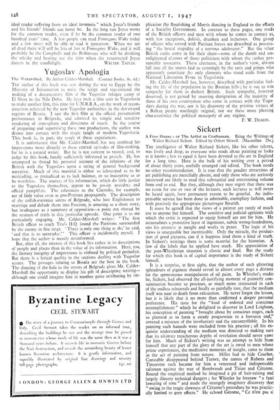Yugoslav Apologia
The Watershed. By Arthur Calder-Marshall. (Contact Books. 8s. 6d.) THE author of this book was sent during the war to Egypt by the Ministry of Information to write the script and superintend the making of a documentary film at the Yugoslav refugee camp at El Shaft in the Nile Delta. He later took a film unit to Yugoslavia to make another film, this time for U.N.R.R.A., on the work of recon- struction achieved by the new Yugoslav authorities in the devastated regions of Bosnia. I saw the first film at the official presentation performance in Belgrade, and admired its simple and sensitive rendering of atmosphere and directness of touch. In the course of preparing and supervising these two productions, the author was drawn into contact with the tragic tangle of modern Yugoslavia. This book is, in part, the result of these experiences. It is unfortunate that Mr. Calder-Marshall has not confined his impressions more directly to these central episodes of film-making, for he is a natural writer. But he is not content to record, and, to judge by this book, hardly sufficiently informed to preach. He has attempted to thread his personal account of the relations of the British with the Yugoslays upon a string of general background narrative. Much of this material is either so telescoped as to be misleading, so prejudiced as to lack balance, or so inaccurate as to be worthless. The sources of his information, which do little justice to the Yugoslays themselves, appear to be gossip, anecdote. and official pamphlets. The references to the Chetniks, for example, are of little value even as pro-Partisan propaganda. The description of the collaborationist sirens of Belgrade, who lure Englishmen to marriage and delude them into Fascism, is amusing as a short story, but inadequate as a summary of opposition—a point not altered by the stratum of truth in this particular episode. One point is to me particularly engaging. Mr. Calder-Marshall writes: "The first British officer to reach Tito's H.Q. found the Partisans surrounded by the enemy in five rings. ` There is only one thing to do,' he said, `and that is to surrender." This officer is incidentally myself. I hope that the author is merely misinformed. But, after all, the interest of this book lies rather inns descriptions of people and places than in the value of its information. Here, too, the literary integrity of impressions is violated by political prejudice. But there is a .lyrical quality in the sections dealing with Yugoslav scenes. The passages relating to Bosnia are the best in the book. The dancing of the kola in the streets of Belgrade gives Mr. Calder- Marshall the opportunity to display his gift of descriptive writing— although one could imagine him in Another guise attributing by im- plication the flourishing of Morris dancing in England to the efforts of a Socialist Government. In contrast to these pages, one reads of the British officers and men with whom he comes in contact as, with few exceptions, doltish, drunken and lecherous. One group of officers who served with Partisan forces are described as possess- ing " the brutal stupidity of a nervous adolescent." But the other British ranks come in for their share—some of the dumb and un- enlightened electors of those politicians with whom the author pre- sumably associates. These creatures, in the author's view, always fall into all the snares laid so cunningly by the tarts and pimps who apparently constitute the only elements who stand aside from the National Liberation Front in Yugoslavia. Mr. Calder-Marshall has, however, described with particular feel- ing the life of the population in the Bosnian hills ; he is out to win sympathy for them in darkest Britain. Such sympathy, however deserved, is not gained by sneering denigration of the majority of those of his own countrymen who came in contact with the Yugo- slays during the war, nor is his discovery of the pristine virtues of a Balkan people startlingly original, nor are these more pleasing characteristics the political monopoly of any regime. F. W. DEAKIN.


































 Previous page
Previous page